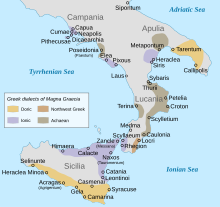Our website is made possible by displaying online advertisements to our visitors.
Please consider supporting us by disabling your ad blocker.
Italian school (philosophy)

The Italian school of pre-Socratic philosophy refers to Ancient Greek philosophers in Italy or Magna Graecia in the 6th and 5th century BC.[1][2][3] Contemporary scholarship disputes the Italian school as a historical school rather than simply a geographical one.[4]
The doxographer Diogenes Laërtius divides pre-Socratic philosophy into the Ionian and Italian school.[5][6][7] According to classicist Jonathan Barnes, "Although the Italian 'school' was founded by émigrés from Ionia, it quickly took on a character of its own."[8] According to classicist W. K. C. Guthrie, it contrasted with the "materialistic and purely rational Milesians."[9]
The Italian school included the Pythagorean school,[1][10] Parmenides and the Eleatic school, Xenophanes, and Empedocles. According to Diogenes Laërtius, the succession goes Pythagoras (“pupil of Pherecydes”), Telauges (his son), Xenophanes, Parmenides, Zeno of Elea, Leucippus, Democritus (“who had many pupils”), Nausiphanes [and Naucydes] (“in particular”), and Epicurus (Succession ends).[7][11][12] Parmenides, Xenophanes, and Empedocles all wrote in verse.[13]
Aristotle notes, as he criticizes the Pythagorean view of a Counter-Earth, "Most people...say it lies at the center. But the Italian philosophers known as Pythagoreans take the contrary view."[14][15]
- ^ a b Robert Blakey (April 21, 1848). "History of the Philosophy of Mind: Embracing the Opinions of All Writers on Mental Science from the Earliest Period to the Present Time". Trelawney Wm. Saunders. p. 17 – via Google Books.
- ^ Werner Jaeger. The Theology of the Early Greek Philosophers: The Gifford Lectures 1936. p. 38.
- ^ Mueller, Ian and Wolfgang G. Haase. “Heterodoxy and Doxography in Hippolytus’ ‘Refutation of All Heresies’.” (1992).
- ^ Laurent, Régis. An Introduction to Aristotle's Metaphysics of Time: Historical Research Into the Mythological and Astronomical Conceptions that Preceded Aristotle's Philosophy. France, Villegagnons-Plaisance éditions, 2015. p. 151
- ^ Laks, André (May 3, 2018). "The Concept of Presocratic Philosophy: Its Origin, Development, and Significance". Notre Dame Philosophical Reviews. Daniel W. Graham.
- ^ "A History of Western Philosophy 1.3". maritain.nd.edu.
- ^ a b Oxford Handbook of Presocratic Philosophy, p. 297
- ^ Barnes 2002, p. 78.
- ^ Pre Socratic Philosophy (Cambridge Encyclopedia of Philosophy, 1961) p. 443
- ^ Bibliotheca Sacra. Dallas Theological Seminary. 1851.
- ^ "The Succession of Philosophical Schools – Donald Robertson". 4 March 2013.
- ^ Taub, Liba. Science Writing in Greco-Roman Antiquity. N.p., Cambridge University Press, 2017. p. 117
- ^ Poetry and Poetics in the Presocratic Philosophers by Tom Mackenzie
- ^ Aristotle On the Heavens, 2. 13
- ^ Sandywell, Barry. Presocratic Reflexivity: The Construction of Philosophical Discourse C. 600-450 B.C.: Logological Investigations: Volume Three. United Kingdom, Taylor & Francis, 2002., p. 197
Previous Page Next Page


